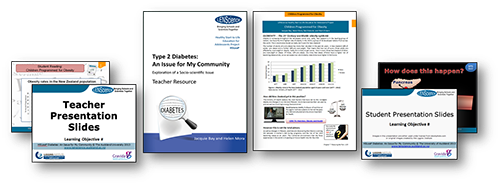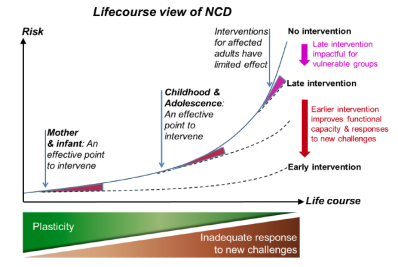Year 11 - Science and/or Biology Classes
Class size: Up to 32 students
The programme links to the LENScience Healthy Start to Life Learning Module - Type 2 Diabetes: An Issue for My Community
Students will be introduced to and explore the issue of Type 2 Diabetes as it impacts New Zealand communities. They will examine research evidence that is contributing to our understanding of Diabetes risk and prevention. This programme is supported by the LENScience Diabetes learning module, linking to objectives at Level 6 of the New Zealand Curriculum.

Year 11 - Science and/or Biology Classes
Class size: Up to 32 students
The programme links to the LENScience Healthy Start to Life Learning Module - Type 2 Diabetes: An Issue for My Community
Gain hands-on experience of tools that are used in the diagnosis of diabetes
Explore perceptions of the role of science in society and the work that is carried out by scientists via small group interactions with scientists during the programme.
Socio-scientific issues are complex, socially relevant issues that have conceptual or procedural links to science (Sadler 2004). The Type 2 diabetes epidemic is a socio-scientific issue. Exploring the cause, effect and social impact of the disease requires students to engage in a complex matrix of biological, social and economic factors. Typically of socio-scientific issues, addressing the issue of the impact of the Type 2 diabetes epidemic on individuals, communities and societies is complex and requires interaction between biological, social and economic ideas and strategies. Learning experiences that are situated in exploration of complex, socially relevant issues for which there is no direct solution, such as this, support students to develop scientific and health literacies that will enable them to negotiate socio-scientific issues as citizens.
Sadler, T. (2004) Informal Reasoning Regarding Socioscientific Issues: A Critical Review of Research. Journal of Research in Science Teaching 41, 513–536.

A lifecourse approach to reduction in risk factors for non-communicable disease
A large body of epidemiological and experimental evidence shows that early life influences play a major role in determining risks of childhood obesity and cognitive or emotional disorders, and of the later onset of heart disease, diabetes, osteoporosis and other conditions. Students will be introduced to and explore work, to which New Zealand scientists are contributing, that addresses the key question of how and why early life events affect developmental outcomes. A key concept underpinning this research is that environmental cues during early life may act through the processes of developmental plasticity to modify the life-course in ways that have the potential to be adaptive. The mechanisms of developmental plasticity have evolved to tune the developing organism to its later environment; however, in the mammal there are particular risks of faulty transduction of environmental cues in early development, leading to an increased risk of poor health in later life.
The New Zealand Curriculum 2007 | Level 6 Science.
Nature of Science:
Understanding About Science
Investigating in science
Communicating in science
Participating and contributing
Living World:
Level 6 | Life Processes
Biology
AS90926 | Report on a Biological Issue
AS90929 | Demonstrate understanding of biological ideas relating to a mammal(s) as a consumer(s)